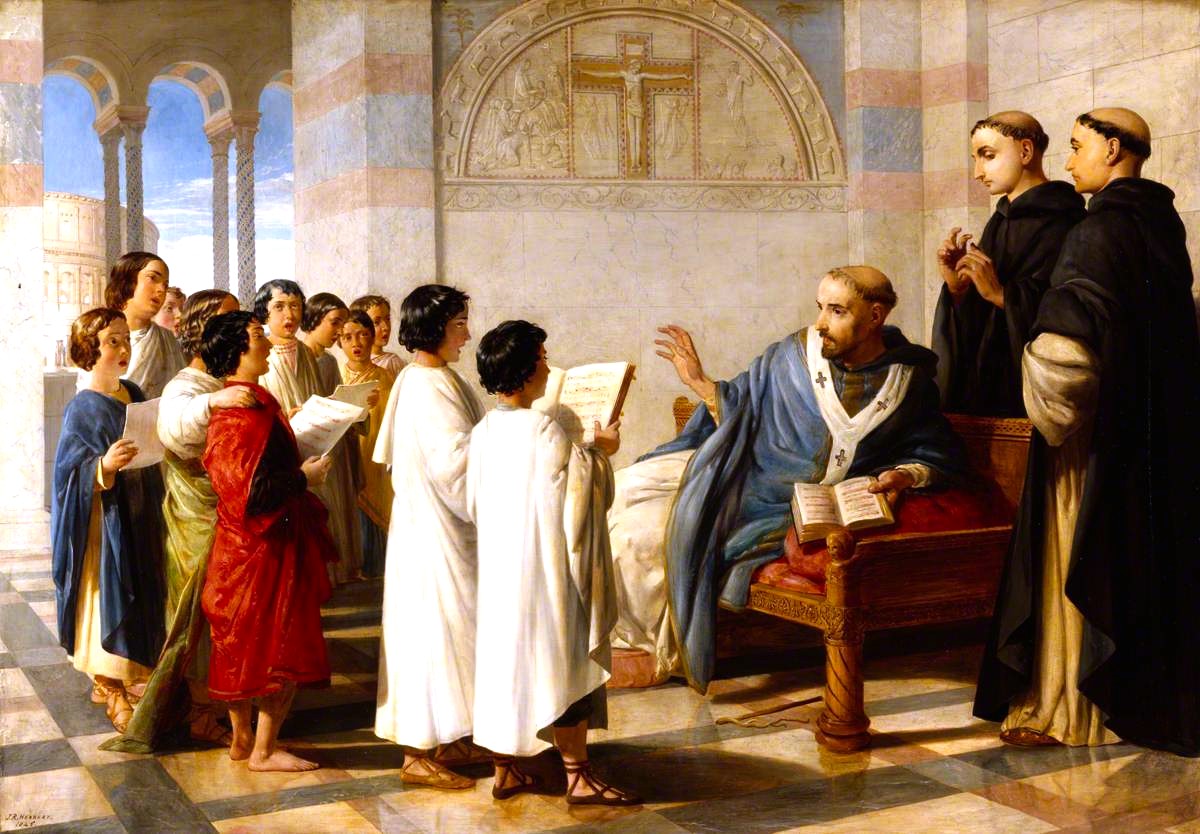Translation of the Holy Gospel According to Luke
At that time, when a very great multitude was gathered together and hastened out of the cities unto Jesus, He spoke by a similitude: The sower went out to sow his seed: and as he sowed, some fell by the wayside, and it was trodden down, and the fowls of the air devoured it. And other some fell upon a rock: and as soon as it was sprung up, it withered away, because it had no moisture. And other some fell among thorns, and the thorns growing up with it choked it. And other some fell upon good ground: and being sprung up yielded fruit a hundredfold. Saying these things, He cried out: He that hath ears to hear, let him hear. And His disciples asked Him what this parable might be. To whom He said: To you it is given to know the mystery of the kingdom of God, but to the rest in parables: that seeing they may not see, and hearing may not understand. Now the parable is this. The seed is the word of God. And they by the wayside are they that hear: then the devil cometh and taketh the word out of their heart, lest believing they should be saved. Now they upon the rock are they who, when they hear, receive the word with joy; and these have no roots: for they believe for a while, and in time of temptation they fall away. And that which fell away among thorns are they who have heard and, going their way, are choked with the cares and riches and pleasures of this life, and yield no fruit. But on the good ground are they who in a good and perfect heart, hearing the word, keep it, and bring forth fruit in patience.
From St. Pope John Paul II’s Address to the Bishops of Japan, March 1990*
As the “universal sacrament of salvation” (Lumen Gentium LG 48), the Church as a whole is called ” to be a leaven and, as it were, the soul of human society in its renewal by Christ and transformation into the family of God ” (Ibid. 40).
A deepening awareness of God’s call to proclaim the Good News of salvation in Jesus Christ should penetrate every aspect of the Church’s life… [Local Churches] must.. strive to make the light of Christ shine brightly, so as to help non-Christians to see this light, to accept it, and to be transformed by it through faith and Baptism. No believer may be dispensed from the task of making Christ’s love known to all. For if, with Saint Paul, we can say: the love of Christ compels us (2 Cor, 5:14), we must likewise add, as he does: Woe to me if I do not preach the Gospel! (1 Cor, 9:16). As the Conciliar Decree Ad Gentes reminds us: It is not sufficient for the Christian people to be present or established in a particular nation, nor sufficient that it should merely exercise the apostolate of good example; it has been established and it is present so that it might by word and deed proclaim Christ to non-Christian fellow countrymen and help them towards a full reception of Christ” (Ad Gentes, 15).
[The Church’s] mission should not be absorbed by preoccupations concerning the temporal order or reduced to such preoccupations. Hence she takes great care to maintain clearly and firmly both the unity and distinction between evangelization and human promotion: unity, because she seeks the good of the whole person; distinction, because these two tasks enter, in different ways, into her mission” (Libertatis Conscientia, 64).
…
Another area of utmost importance for the life of the Church and of society is marriage and family life. … the stability and fruitfulness of marriage are threatened by divorce and the practice of artificial contraception. Catholics who marry non-Catholics often face serious challenges to their perseverance in the faith. As Pastors, you exercise a sacred charge by confirming your people in Christian living, lest, for lack of roots, they believe for a while and in time of temptation fall away (Luke, 8:13). Discerning the “signs of the times” requires that the Church be attentive to people and their problems, but it also demands that she be faithful to the Gospel. The Good News calls people of every time and place, including ourselves, to repentance and faith, to a change of heart, to a new way of thinking and acting in accordance with God’s plan of salvation, as it was perfectly fulfilled in the Crucified and Risen Christ.
The mission of evangelization carried out by the faithful… depends in great part of the formation which they receive. As Bishops you exercise an essential role as teachers, assisted by your priests. Great pastoral wisdom and charity must be developed among the clergy through a life-long commitment to prayer, reflection and study, so that they in turn can impart a more through Christian formation to the laity…
If formation is to bear fruit in the field of evangelization, it must not only match the laity’s level of general education, but must also be deeply spiritual. It must touch people’s minds and hearts, stir their consciences, and engage all their energies as they strive to live out the state in life to which God has called them. When Christians come to realize that there is an unbreakable bond between their faith and daily life, they become powerful instruments of the Holy Spirit in transforming the world from within. When the imperatives of faith are truly interiorized through communion with God in the liturgy and personal prayer, their application to life is clearly perceived as a personal responsibility. In the words of Evangelii Nuntiandi: “Evangelizing zeal must spring from true holiness of life, and, as the Second Vatican Council suggests, preaching must in its turn make the preacher grow in holiness, which is nourished by prayer and above all by love for the Eucharist” (EN, 76).
The goal of formation is to make all the baptized active shares in the Church’s life and mission. As we read in Ad Gentes: “The Church is not truly established and does not fully live, nor is a perfect sign of Christ unless there is a genuine laity existing and working alongside the hierarchy. For the Gospel cannot become deeply rooted in the mentality, life and work of a people without the active presence of lay people (AGD, 21)…
 The “active presence” of the laity of which the Council speaks takes many other forms as well. As we noted earlier, it includes good example and an explicit proclamation of Christ in word and deed (cfr. AGD, 15), but it also calls for something more. If the faith of… Catholics is to be reflected in the “mentality, life and work” of their nation, then they must not be afraid to take an active role as Catholics in the building up of a more human society. The connection between faith and life applies not only to their personal conduct; it also means that they will bring the Gospel to bear on civic activities, on economic and political decisions, and on national and international endeavors. As followers of Christ they will want to defend and promote the spiritual and material well being of all people, especially the poor (cfr. Sollicitudo Rei Socialis, 47). The Christian vision of man created and redeemed by God, which is so richly developed in the Church’s social teaching, provides the foundation as well as the inspiration for the Church… to conduct a ministry of evangelization in keeping with man’s earthly and transcendent vocation.
The “active presence” of the laity of which the Council speaks takes many other forms as well. As we noted earlier, it includes good example and an explicit proclamation of Christ in word and deed (cfr. AGD, 15), but it also calls for something more. If the faith of… Catholics is to be reflected in the “mentality, life and work” of their nation, then they must not be afraid to take an active role as Catholics in the building up of a more human society. The connection between faith and life applies not only to their personal conduct; it also means that they will bring the Gospel to bear on civic activities, on economic and political decisions, and on national and international endeavors. As followers of Christ they will want to defend and promote the spiritual and material well being of all people, especially the poor (cfr. Sollicitudo Rei Socialis, 47). The Christian vision of man created and redeemed by God, which is so richly developed in the Church’s social teaching, provides the foundation as well as the inspiration for the Church… to conduct a ministry of evangelization in keeping with man’s earthly and transcendent vocation.
*The text of the Address has been slightly modified to make it universally applicable. Modifications noted by [ ] — PPP

